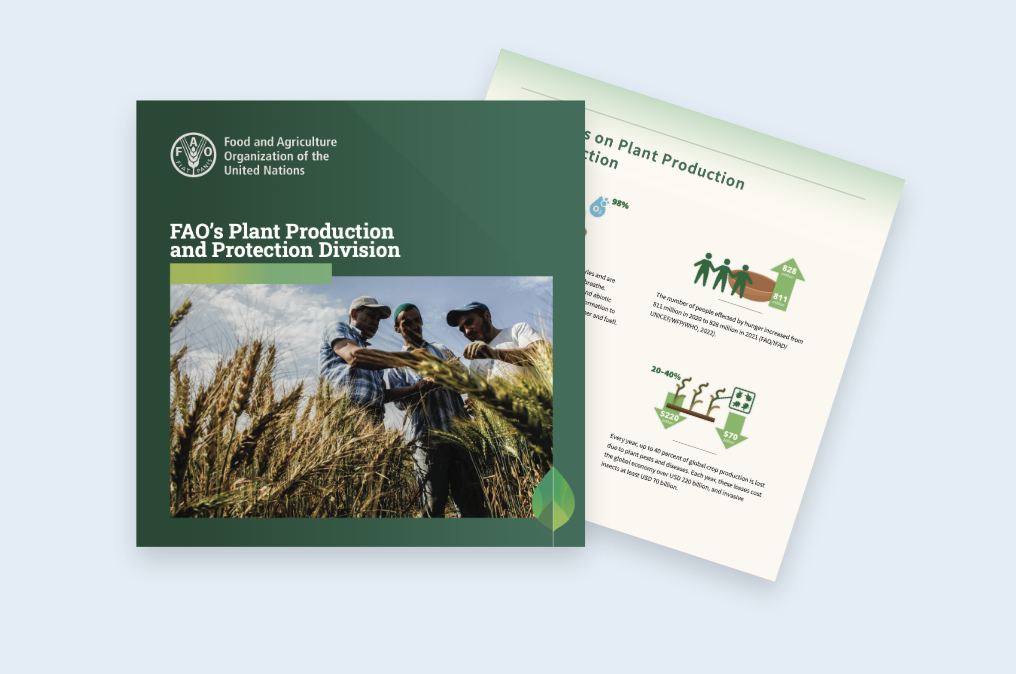Plant Production and Protection Division (NSP)
 | The Plant Production and Protection Division (NSP) supports countries in the transition to sustainable crop production systems. NSP works with countries and a broad range of partners in developing and promoting agro-ecological approaches to sustainable crop production that build on ecosystem services while enhancing and protecting the underlying natural resource base. |
- Adopt an ecosystem approach to crop production to develop agro-ecological knowledge and practices which enhance biodiversity and ecosystem services, and contribute to climate change adaptation and resilience.
- Promote sustainable crop production and diversification to improve people’s nutrition, livelihoods and incomes in both rural and urban areas.
- Improve timeliness and productivity of agricultural operations, and enable a shift from subsistence to more market-oriented farming through appropriate mechanization systems and technologies.
- Ensure access to well adapted, resilient and nutritious crops and varieties, conserve crop germplasm and strengthen seed delivery systems.
- Monitor and respond to transboundary plant pests and diseases to mitigate their impact by setting up surveillance, early warning and effective pest control systems.
- Reduce the reliance on pesticides by applying an integrated pest management approach.
- Develop international quality standards and technical guidelines to reduce the risks of pesticide use, leading to consumer and environmental protection.
Structure
Office of the Director (NSPDD)
Director: Vacant
Deputy Director: Chikelu Mba
.jpg?sfvrsn=2c811678_11)
Seeds and Plant Genetic Resources (NSPGD)
The team leads the efforts to enhance farmers’ access to quality seeds and planting materials of nutritious well-adapted crops and varieties. To achieve this, country governments are assisted in conserving plant genetic resources for food and agriculture, improving crops and developing resilient seed systems.
Contact: OiC Ms. Bonnie Furman
.jpg?sfvrsn=6703b5f0_11)
Ecosystem approach to crop production intensification (NSPED)
The team leads the efforts to promote agro-ecological knowledge and practices, and improve the sustainability and resilience of farming systems of smallholder farmers (including family farmers) through ecosystem-based approaches. This involves conserving and enhancing above and below ground biodiversity, soil health and efficient nutrient management strategies in cropping systems.
Contact: Mr Ronnie Brathwaite

Rural and Urban Crop and Mechanization Systems (NSPLD)
The team leads the efforts to promote sustainable crop production and diversification, improving people’s nutrition, livelihoods and income. This involves adopting sustainable production practices, developing policies to improve crop production (including underutilized crops), strengthening rural-urban linkages, and adopting sustainable mechanization technologies and strategies.
Contact: Mr Fenton Beed
.jpg?sfvrsn=c2651ab2_11)
Locusts and Transboundary Plant Pests and Diseases (NSPMD)
The team leads the efforts in developing and implementing mechanisms to mitigate the potential impact of transboundary plant pests and diseases. This involves surveillance of pest populations and environmental conditions, early warning systems, regional cooperation between concerned countries, environmentally sound pest control systems and crises response.
Contact: Mr Shoki AlDobai
.jpeg?sfvrsn=f8d1086a_11)
Rotterdam Convention (NSPRD)
This FAO team and colleagues in UNEP jointly provide the Secretariat for the Rotterdam Convention on the Prior Informed Consent Procedure for Certain Hazardous Chemicals and Pesticides in International Trade. Their work involves sharing information on hazardous chemicals and pesticides, and empowering parties to take informed decisions on their sustainable use.
Contact: Ms Christine Fuell
.jpeg?sfvrsn=f84b6869_11)
Pest and Pesticide Management (NSPCD)
The team leads the efforts to reduce reliance on pesticides by adopting an integrated pest management approach and to uphold sound management of pesticides. This involves developing international standards, guidelines and tools to protect consumers and the environment from risks stemming from pesticide use, and building national capacity on pesticide management and Farmer Field School programmes.
Contact: Mr Baogen Gu
Our story
FAO’s Plant Production and Protection Division is almost as old as FAO itself! First established on 22 June 1947 as the Plant Industry Branch, by 1959 it was a full division focusing on crop production, improvement and protection. During the 1960s–1980s, the Division was broadly structured on crop and grasslands production services, plant protection services, and crop ecology and genetic resources. In 1980s–2000s, there was an increased emphasis on fruits and vegetables. And, in 2020, the Division acronym changed from AGP to NSP, with a renewed focus on sustainable production and protection through optimization and minimization.

International Day of Potato
30 May
Key Publications
Highlights
- One Country One Priority Product
- International Year of Millets 2023
- Urban and peri-urban agriculture
- International Day of Plant Health
- Agroecology Knowledge Hub
- Sustainable Agricultural Mechanization



